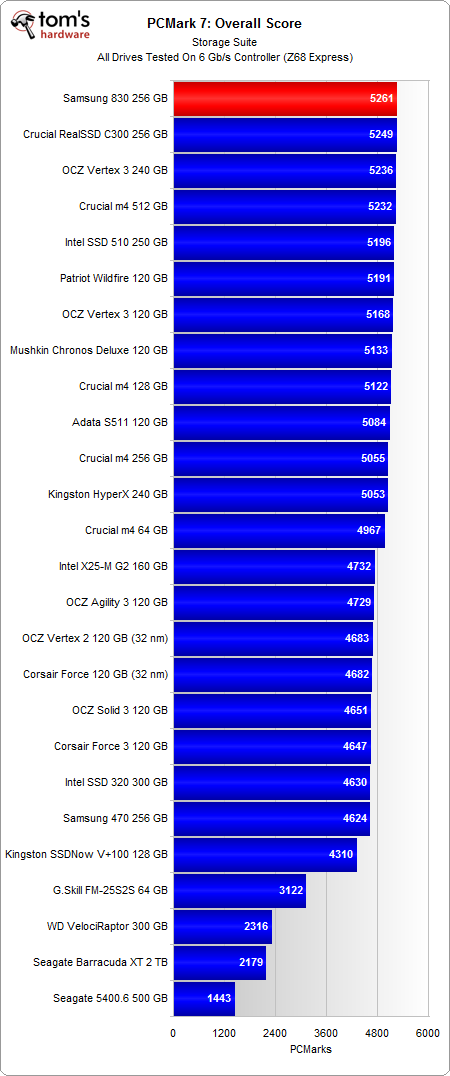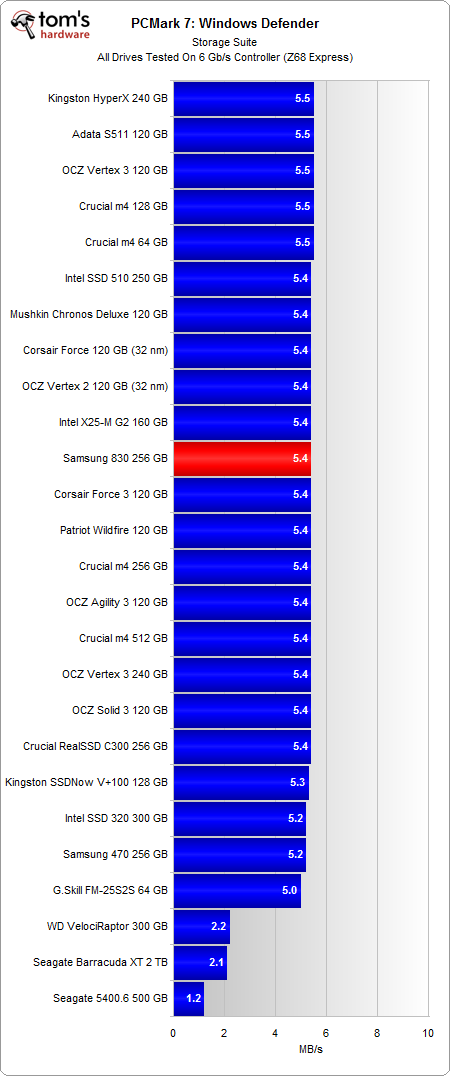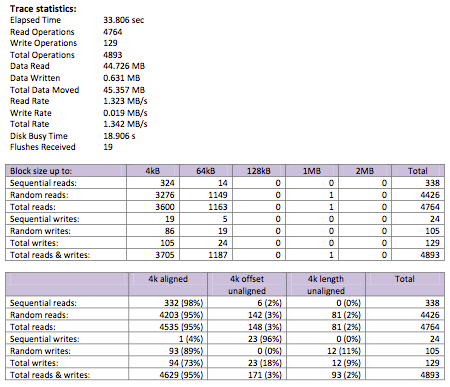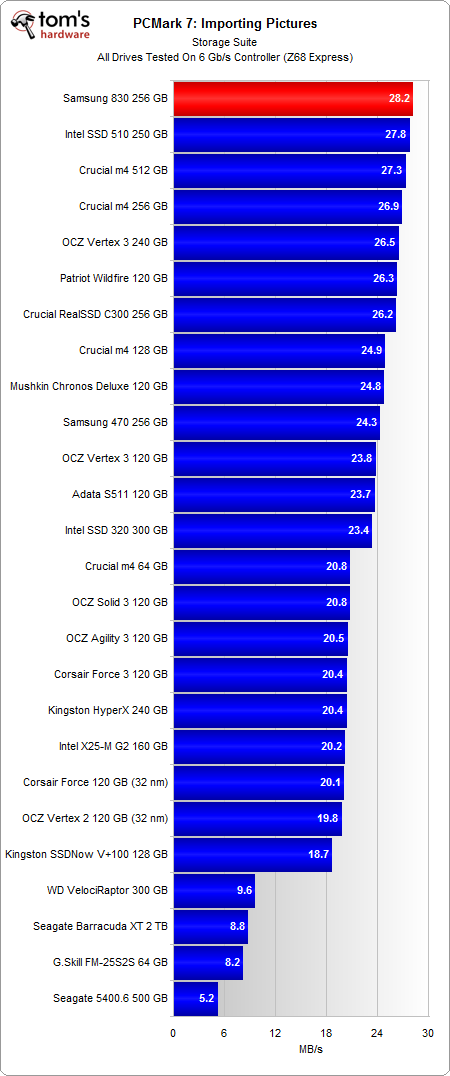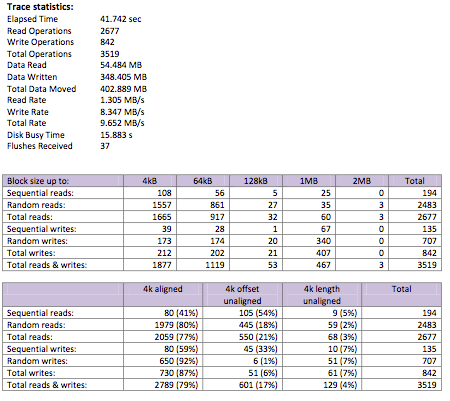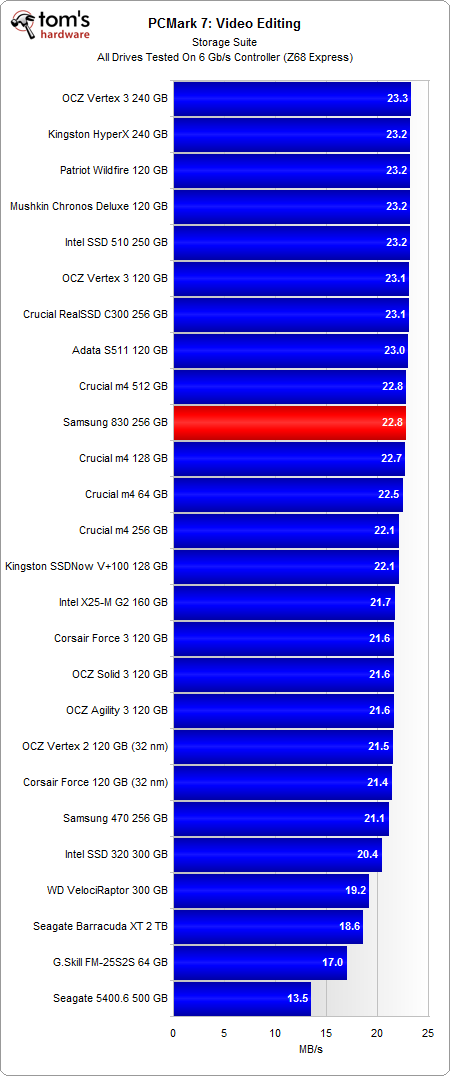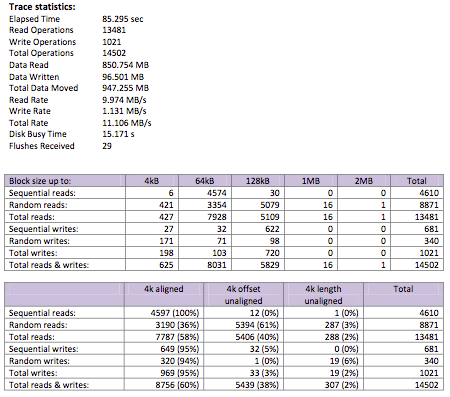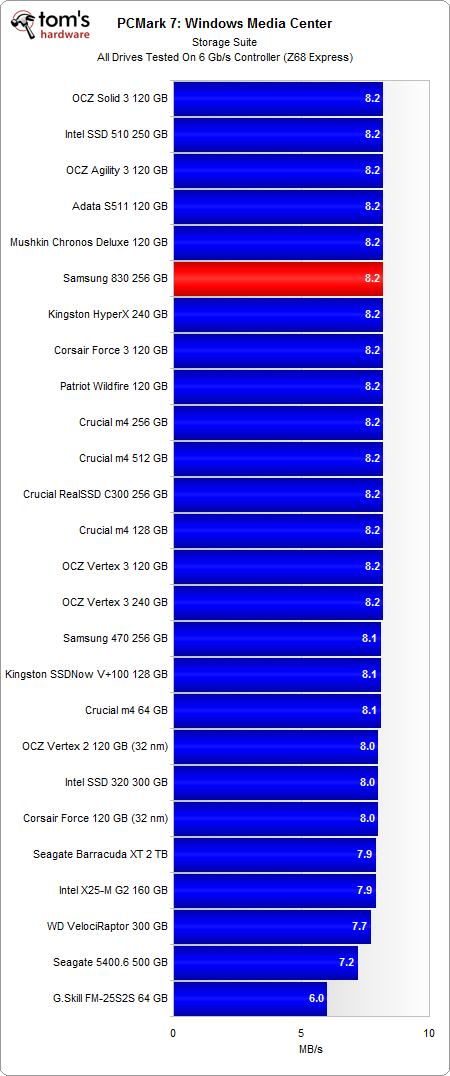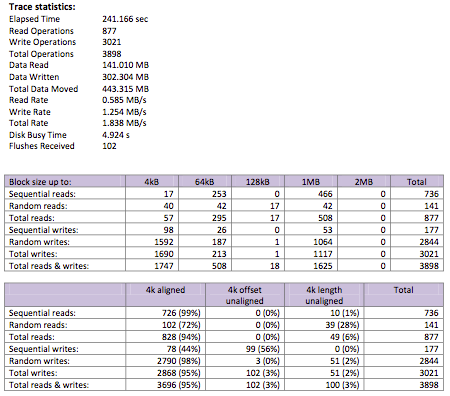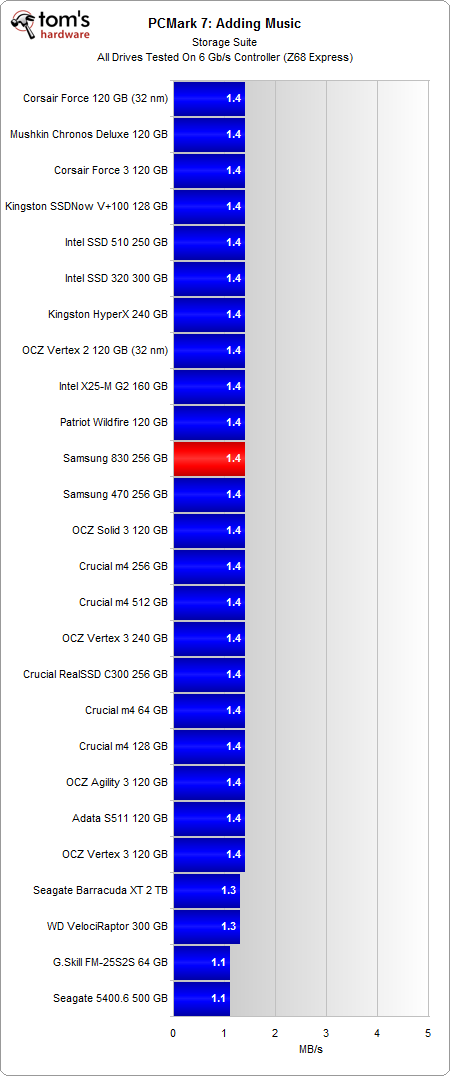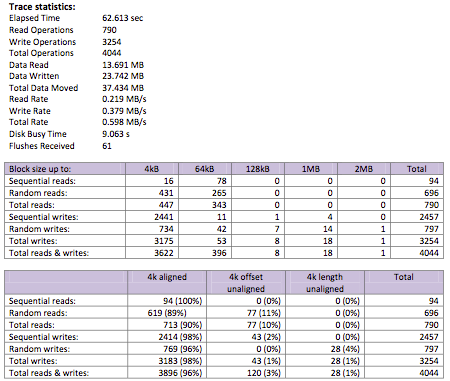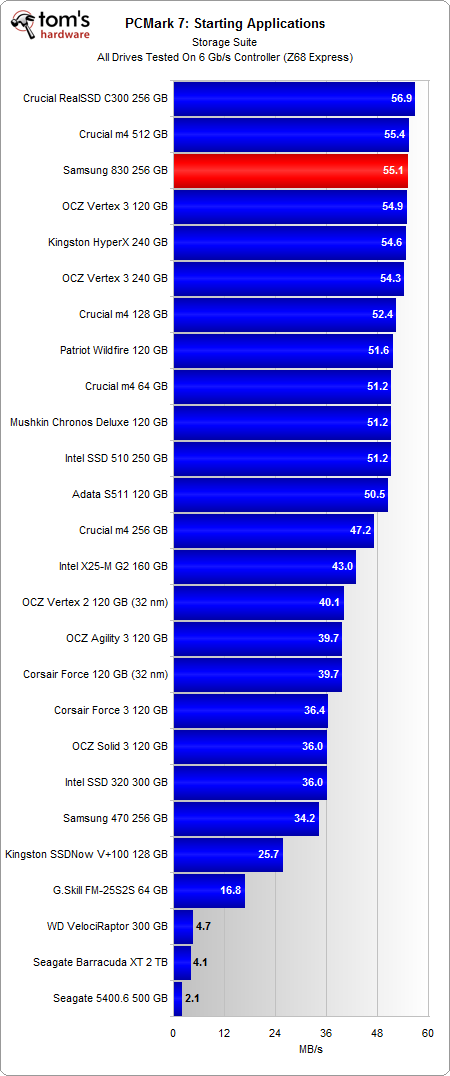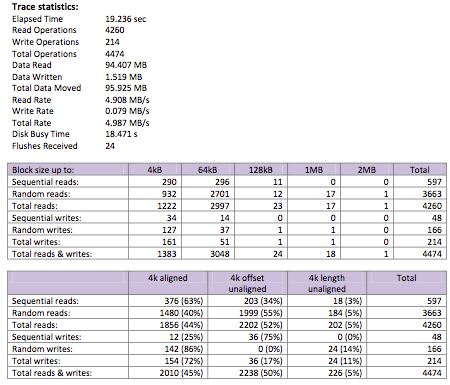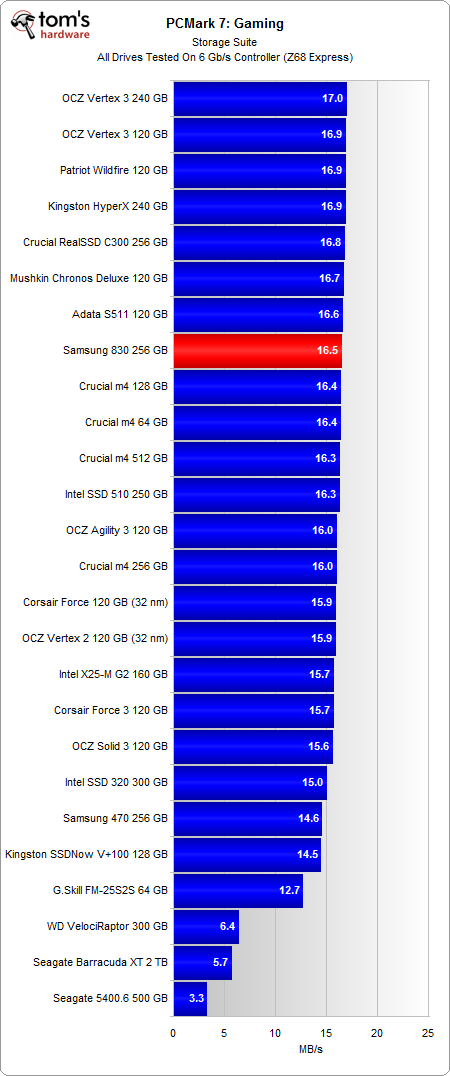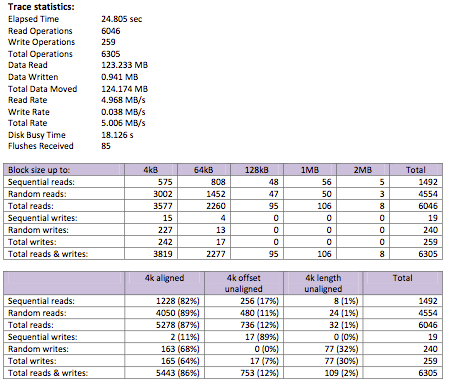Samsung Goes 6 Gb/s: Is The 830-Series SSD King Of The Hill?
PCMark 7: Storage Suite
PCMark 7 is the latest synthetic from Futuremark. The older Vantage test gives a moderate approximation of storage performance, but there are situations where the scores vary too much from one run to another to make it a great tool for evaluating SSDs. Both metrics use the same underlying trace-based technology from Intel's IPEAK. However, Futuremark's programmers made a few changes in the latest version that it claims improve its accuracy, though it's still hard to make sense of this benchmark's results. Fortunately, at least the variability is gone.
The 256 GB Samsung 830 jumps to the front of the line, but just barely. The overall storage score in PCMark 7 is based on a geometric mean of the subtests. That's why it's important to take a deeper look into the individual tests themselves.
The Windows Defender test is based on a trace of Windows' Defender utility performing a Quick Scan of the system. This is very read-heavy scenario composed of lots of random access. In fact, read operations make up 97.9% of the trace. Of the read operations, 93% are random accesses. Naturally, anti-virus scanning and file searches are the two more applicable real-world scenarios for a test like this.
The 256 GB 830 falls behind in this benchmark, as the 128 GB m4 and 120 GB Vertex 3 run at the head of the pack. Random I/O is clearly not the 830's strong suit, which explains why it can't top this chart.
The second test in PCMark 7's storage suite is a trace based on importing 68 images (434 MB total) from a USB thumb drive into Windows Live Photo Gallery. This doesn't actually include copying the image files. The trace only includes the I/O activity pertaining to indexing. This type of scenario involves writing more data than is read, and most of the writes are random.
The 830 jumps to the front of the line here. While Samsung's latest SSD delivers modest random write performance, several sequential read operations occur at larger transfer sizes, which help push performance in the 830’s favor.
The Video Editing test is based on the I/O activity of publishing a 1080p video in Windows Live Movie Maker. We're dealing specifically with a scenario where multiple high-def sources are combined and written to a single output file. Overall, the split is 30/70 between random and sequential reads, and reads are more prevalent than writes. In fact, the ratio is about 1:9 in favor of reads.
Get Tom's Hardware's best news and in-depth reviews, straight to your inbox.
The writing portion of the workload consists almost completely of incompressible video data, which puts SandForce-based SSDs at a disadvantage. The 256 GB 830 fares no better because there is a sufficient number of random read and write operations. While this doesn't handicap Samsung as much as the SandForce-based drives, it's still clearly not a benchmark that caters to the 830's strengths.
The Windows Media Center test is based on a trace of an HTPC recording two simultaneous TV shows in Windows Media Center, while playing a separate prerecorded show. We're basically reading one file and writing two others.
This type of scenario involves a lot of random writes (94%), because Windows Media Center incrementally adds data to the video file as the TV show progresses. Reads are another story, as they're almost all sequential (84%). Playing a video file is different than recording one; when you play a video file, you're loading it up and playing it back as a continuous stream.
In this scenario, there's practically very little difference between SSDs.
The Adding Music test in PCMark 7 is a not exactly what it sounds like. Futuremark hooked a drive filled with 68 GiB of music files (lossless WMA) to a computer and recorded the I/O activity while Windows Media Player added the audio tracks to the music library. The important point is that this doesn't actually involve copying files to the disk. Rather, it's all about scanning and indexing music files. You'd think that means more random reads and almost no writes, but indexing involves adding to a database of information. That's why we're dealing with more sequential writes (75% of all writes) and a situation where reads are outnumbered by writes 2:1.
In this benchmark, we're presumably restricted by the low transfer rate of the external disk with all of the music files.
The Starting Application trace is extremely brief in that it's only made up of loading the PCMark 7 Whitepaper v1.0 PDF and opening Internet Explorer from the taskbar (19.236 seconds). That adds up to reading a 717 KB PDF file and loading executables, along with related file dependencies from the system drive. The amount of data read outnumbers the amount written 63:1, and most of the read accesses are random in nature (86%).
While the Samsung 830 offers mediocre random write performance, random reads improve once you increase queue depth. That's what we see here, as the 830 no longer falls behind the competition. However, it only holds a less than 1% lead over the 240 GB Vertex 3. Compared to the 256 GB m4, the gap widens to 17%.
The Gaming test involves starting and loading World of Warcaft, which is why we're dealing almost exclusively with reads. Most of the read operations are random in nature, but in terms of the total amount of data read, there's a fairly even split between sequential and random accesses. Even though there are 3002 random reads and 575 sequential reads with block sizes up to 4 KB, this cumulatively only accounts for less than 14 MB of the total 123 MB read. At block sizes between 1 and 2 MB, there are more sequential reads than there are random reads.
Current page: PCMark 7: Storage Suite
Prev Page Sequential Performance Versus Transfer Size Next Page Where Does Samsung's 830-Series SSD Stand?-
pbrigido With all of these fast SSDs coming to market, I can only hope that the competition starts to drive down prices soon.Reply -
I still opt for the M4 in all the enthusiast builds I do!Reply
It boils down to reliability, not one hiccup on M4 yet (or any crucial drive Ive installed), 4/5 Sandforce drives I have installed have had some form of callback problem to resolve once deployed, mostly requiring firmware updates, but a few failed drives as well!
Mind you, still better than the early Corsair force Series I used, every single one failed! Stopped using them quick!
Am tempted by OCZ, once they have reliability on their side I will give them a go again! -
Would love to see an article addressing Sandforce controller problems people have been experiencing.Reply
-
mark_hamill Would love to see an article addressing Sandforce controller problems people have been experiencing.Reply -
JamesSneed Looks like a really nice SSD. Samsung has one of the best validation proceses along with Intel and Crucial so I really don't expect people to have issues like they do with OCZ drives. Now the real question how much will it be on the egg?Reply
I saw this quote below in the summary and laughed as nobody in there right mind would use a basic MLC drive in a database server. So Samsung tuned the drive for what it will be used in ,desktops, good.
"Although we'd probably think twice before picking this as our first choice for a database server, it does just fine in an enthusiast's machine." -
JohnnyLucky great review. now we just have to wait and see how the ssd will hold up over the long haul. If it is anything like the 470, then it should be problem free.Reply -
beenthere We'll see how this series of Samsung SSDs fair. The previous gen was a nightmare of problems so I don't think Samsung's validation process is any better that the rest of the SSD suppliers - which is sad when Samsung controls everything including NAND production. It's amazing that we still have SSDs NOT readt for Prime Time.Reply -
AppleBlowsDonkeyBalls beenthereWe'll see how this series of Samsung SSDs fair. The previous gen was a nightmare of problems so I don't think Samsung's validation process is any better that the rest of the SSD suppliers - which is sad when Samsung controls everything including NAND production. It's amazing that we still have SSDs NOT readt for Prime Time.Reply
Proof? I think you just pulled this out of your ass or from someone's that told you some story. The 470 series was VERY reliable.
